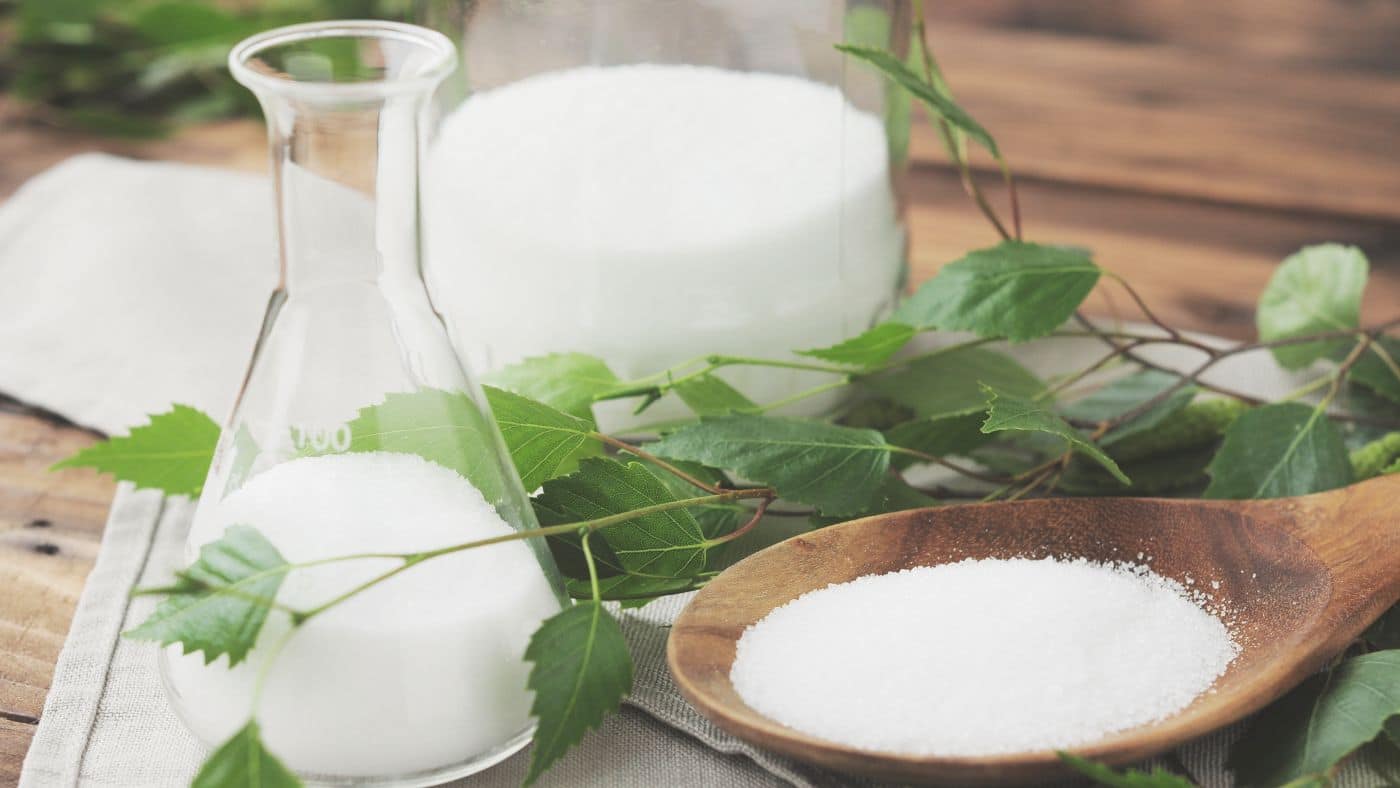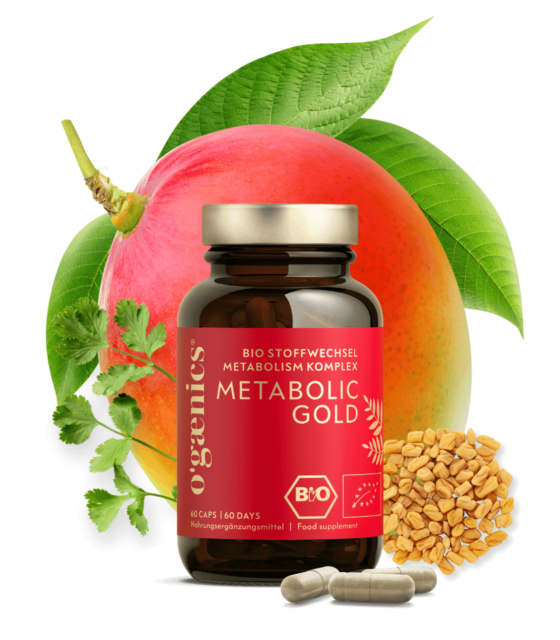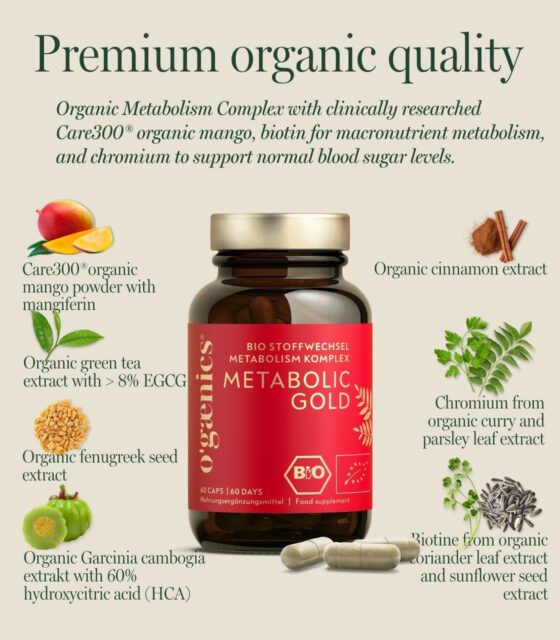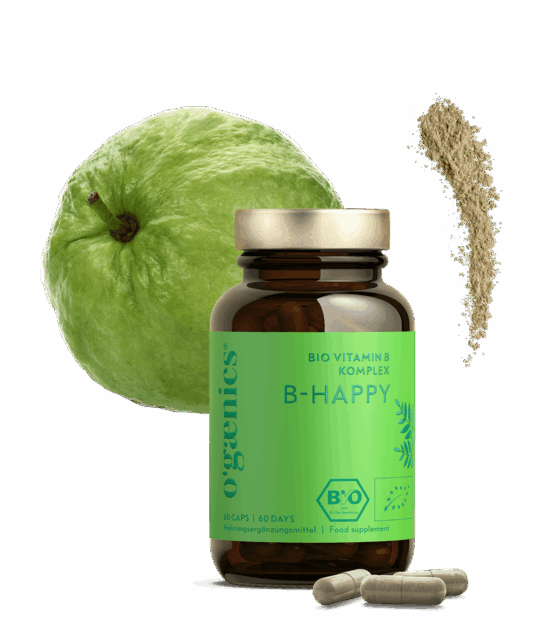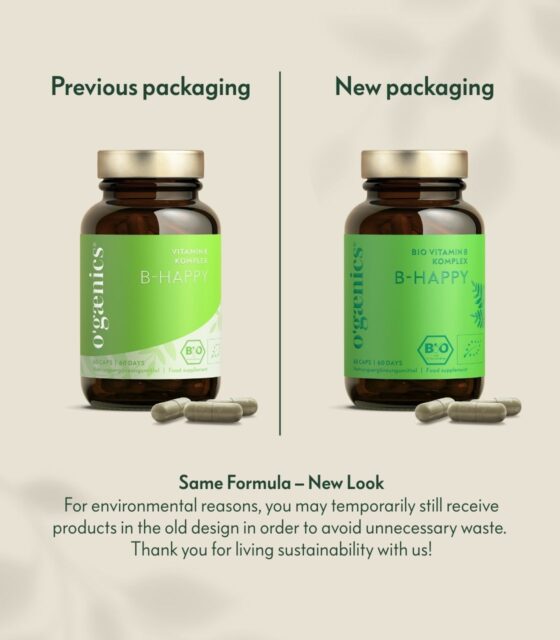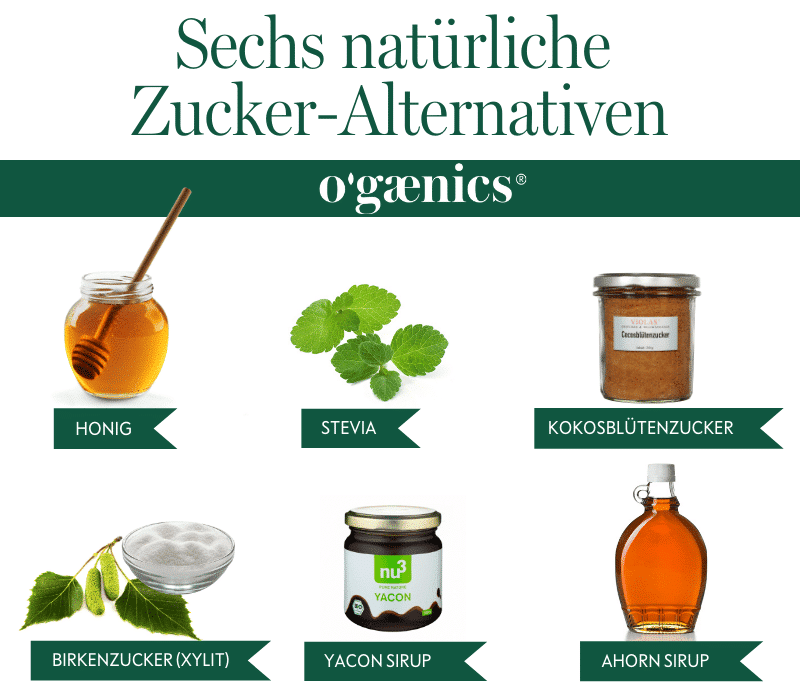Are honey, agave syrup or stevia really healthier? We compared twelve sugar alternatives.
Want to eat less sugar but still enjoy it? Good decision – because excessive sugar consumption can really mess up your blood sugar and metabolism. But which sugar alternatives are really healthier – and what should you look out for if you want to reduce your sugar intake?
In this article, we show you the differences between the common sugar alternatives, which ones you should use sparingly and how you can naturally support your metabolism to avoid cravings and energy slumps.
Why sugar throws your system out of balance
Sugar provides energy quickly, but it diminishes just as quickly. The result: blood sugar fluctuations, cravings and tiredness.
It becomes even more problematic if you regularly reach for high-fructose sweeteners – because fructose puts a strain on the liver and is easily converted into fat.
👉 Good to know:
Household sugar consists of 50 % fructose and 50 % glucose. While glucose can be utilized by every cell, fructose has to be metabolized in the liver. If it is overloaded, this can lead to weight gain, fatty liver and insulin resistance in the long term.(PMC: 5893377)
How to recognize healthy sugar alternatives
If you want to replace sugar, pay attention to these three criteria when making your choice:
Fructose content: The lower, the better – too much fructose puts a strain on the liver.
Glycemic index (GI): This shows how much your blood sugar level rises. Values below 50 are considered favorable.
Nutrient density: Many sweeteners only provide “empty calories” and rob your body of valuable micronutrients such as B vitamins.
Why fructose slows down your metabolism
Fructose has long been regarded as a “healthier sugar” – but this is only partially true. Our body is not prepared for large amounts of fructose. While glucose serves as an energy source in every cell, fructose is only broken down in the liver. If overloaded, it can be converted into fat there – with consequences for metabolism, weight and energy levels. Current scientific studies show that high fructose intake favors the development/progression of non-alcoholic fatty liver disease(PMC: 5893377)
👉 Ogaenic’s tip:
Make sure your sugar alternatives have a low fructose content – and support your energy metabolism with plant-based nutrients such as those contained in the Metabolic Gold Bio Metabolism Complex.
Glycemic index: the measure of your blood sugar
The glycemic index (GI) shows how much your blood sugar level rises after eating.
A high GI causes cravings and energy fluctuations, a low GI keeps you full for longer.
👉 Sweeteners with a GI below 50 are considered particularly beneficial for the metabolism.
Chromium, as contained in Metabolic Gold, helps to maintain normal blood sugar levels – ideal if you want to reduce your sugar consumption.
Sugar robs you of energy – and valuable B vitamins
Your body needs B vitamins so that it can process sugar at all. They are involved in almost all metabolic processes – and are increasingly used up when sugar is consumed regularly. This can lead to tiredness, irritability and concentration problems.
👉 Support your body with natural B vitamins from organic plants – for example with the B-Happy vitamin B complex
12 sugar alternatives in comparison
| Type of sugar | fructose content | glycemic index (GI) | Calories per 100g |
| White sugar (household sugar) | 50% | 65 | 387 |
| Brown sugar | 50% | 65 | 387 |
| Whole cane sugar | 50% | 35 | 399 |
| Fructose | 100% | 25 | 390 |
| Artificial sweeteners (e.g. aspartame, saccharin, cyclamate) | 0% | 0 | 0 |
| honey | approx. 45% | 50 | 302 |
| Agave syrup | >60% | 10-30 | 304 |
| Maple syrup | approx. 35% | 54 | 260 |
| Stevia | 0% | 0 | 0 |
| Coconut blossom sugar | contains inulin/phenols (traces) | 35 | 378 |
| Yacon syrup | FOS-dominant (fructo-oligosaccharides) | very low | 197 |
| Rice syrup | almost only glucose/maltose | very high | 327 |
| Sugar alcohols (e.g. sorbitol mannitol, isomalt, maltitol, lactitol, xylitol/birch sugar, erythriol) | Only xylitol and erythriol are not converted into fructose | 240 |
White sugar (table sugar)
Household sugar is a so-called twofold sugar, which is broken down into glucose and fructose in the blood.
Advantages: We perceive household sugar as having a neutral taste.
Disadvantages: It has a high glycemic index and many calories. Sugar also damages the teeth.
Brown sugar
Brown sugar is identical to white sugar. The brown color comes simply from syrup residues.
Advantages: Brown sugar, like table sugar, is neutral in taste.
Disadvantages: It has a high glycemic index and many calories. Brown sugar damages teeth just as white sugar does .
Whole cane sugar
Whole cane sugar is obtained from sugar cane and is less sweet than table sugar. It has a slightly caramel flavor.
Advantages: It contains minerals and trace elements in minute quantities.
Disadvantages: Whole cane sugar raises blood sugar levels just as white sugar does and can damage teeth just as much.
Fructose
Industrially processed, isolated fructose is found in many processed foods.
Advantages: Fructose is 2.5 times sweeter in taste than table sugar, so you need less of it.
Disadvantages: Excessive consumption attacks the intestinal flora and can lead to leaky gut syndrome. Fructose is also a risk factor for gout, kidney stones, cardiovascular disease and can damage teeth.
Artificial sweeteners (e.g. aspartame, saccharin, cyclamate)
Advantages: Artificial sweeteners like saccharin have no glycemic index and no calories. They are therefore suitable for diabetics who otherwise have a limited choice of sweeteners. They are also harmless to the teeth.
Disadvantages: Artificial sweeteners do not increase blood sugar levels, but they still have an impact on our bodies. They also have a high addiction potential and trick the brain. This is because the brain is programmed to react to the taste of sweet things.
Studies have shown that the pancreas releases insulin as soon as we have the sweet taste on our tongue – whether the substance contains calories or not. So the body is fooled by the zero-calorie sweeteners. He expects glucose to enter the bloodstream and waits in vain. This can lead to an increased appetite soon after. Some studies have already shown that zero-calorie substances are not suitable for reducing weight. (PMC5634742)
Do you want to reduce sugar but still enjoy it? Then you’ve come to the right place. We have taken a close look at six popular natural sweeteners – with a view to their fructose content, glycaemic index (GI) and their effect on your metabolism.
Because not every ‘healthy sweetener’ is really better for you or your liver.
Honey – the natural but sugary sweetness
Honey consists of around 80 % sugar – mainly fructose, glucose and sucrose – as well as small amounts of vitamins, enzymes and minerals.
Advantages:
- Natural product with an aromatic taste
- Contains small amounts of antioxidants and trace elements
- Sweeter than sugar – you usually need less
Disadvantages:
- High sugar content (GI approx. 50) → causes blood sugar to rise
- Lots of calories (approx. 300 kcal/100 g)
- Not heat-stable: heating destroys enzymes and nutrients
👉 Tip: Choose natural honey from the beekeeper and enjoy it sparingly.
Agave syrup – sweet, but high in fructose
Agave syrup comes from the juice of the Mexican agave plant and contains over 60% fructose (PMC9222424). This makes it significantly sweeter than household sugar, but it has a low glycemic index (approx. 10-30).
Advantages:
- Low GI → Blood sugar rises more slowly
- High sweetening power → less necessary than sugar
- Vegan and versatile
Disadvantages:
- High fructose content can put a strain on the liver and increase the risk of fatty liver and insulin resistance in the long term
- Not tooth-friendly
- Often industrially processed – better to choose organic quality
👉 Conclusion: Only enjoy in small quantities – the low GI belies the fructose content. (PMC9222424)
Maple syrup
Maple syrup is obtained from the bark of the maple tree.
Advantages: Maple syrup is only 60 percent sugar. It is therefore less sweet than household sugar and tastes spicy. As a natural product, it also contains vitamins, antioxidants and anti-inflammatory substances, but only in minute quantities. Its calorie count is also somewhat lower than that of sugar.
Disadvantages: The glycemic index of maple syrup is high and, like sugar, it can damage teeth.
Coconut blossom sugar – caramelly sweetness with a low GI
Coconut blossom sugar is made from the nectar of the coconut palm. It tastes pleasantly mild and caramelly – not like coconut.
Advantages:
- Glycemic index ~35 → blood glucose rises more slowly (PMC7174220, PMC9964017)
- Contains minerals such as potassium, zinc and iron
- Small amounts of inulin can have a slight prebiotic effect
Disadvantages:
- Similar in calorie content to sugar (approx. 380 kcal/100 g)
- For diabetics how to calculate sugar
- GI can vary greatly depending on origin
👉 Conclusion: A slightly better choice than household sugar – but not a free ride…
(PMC7174220, PMC9964017)
Stevia – calorie-free sweetness from the plant
Stevia is obtained from the leaves of the South American plant Stevia rebaudiana. Its steviol glycosides are around 300 times sweeter than sugar, while being calorie-free and blood sugar neutral
Advantages:
- No influence on blood sugar
- Calorie free
- Tooth-friendly
- Heat and baking stable
Disadvantages:
- Slightly bitter aftertaste
- Can – similar to other sweeteners – increase the preference for sweets
- Not everyone likes the typical stevia taste
👉 Conclusion: Ideal for sweetening without blood sugar spikes – but enjoy in moderation so as not to overstimulate your sense of taste.
Yacon syrup – high-fiber sweetness with intestinal benefits
Yacon syrup is obtained from the root of the South American yacon plant and contains mainly fructo-oligosaccharides (FOS) – soluble fiber that is not metabolized.
Advantages:
- Very low glycemic index → hardly any influence on blood sugar(PMC9818590, PMC4963912, PMC11902191)
- Low in calories
- Prebiotic – supports healthy intestinal flora
- Provides small amounts of potassium, calcium, vitamin B1 and C
Disadvantages:
- Hardly any free fructose – positive for health, but less sweet than sugar
- In larger quantities (over 20 g/day), yacon can have a flatulent or laxative effect
👉 Conclusion: One of the most interesting natural sweeteners – ideal if you’re keeping an eye on your blood sugar and gut health.
Rice syrup – fructose-free, but with a high blood sugar effect
Rice syrup is produced when the starch in rice is broken down into maltose and glucose by enzymes.
Advantages:
- Fructose-free – suitable for fructose intolerance
- Mild taste
- Vegan and low in allergens
Disadvantages:
- Very high GI (~98) → sharp rise in blood sugar (Jeske 2016; Yang 2006)
- Hardly any nutrients, similar in calories to sugar
- Not recommended for unstable blood sugar or diet targets
👉 Conclusion: Only interesting for people who have to avoid fructose – not a healthier choice for everyone else.
Sugar alcohols – low-calorie sweetness with side effects
Sugar alcohols – also known as polyols – include compounds such as sorbitol, mannitol, isomalt, lactitol, xylitol (birch sugar) and erythritol. They occur naturally in small quantities in fruits and vegetables and are obtained industrially from plant sugars.
Advantages:
- Significantly fewer calories than sugar (0-2.4 kcal/g depending on type)
- Low glycemic index (<15) – hardly any influence on blood sugar (Lenhart 2017; Mäkinen 2016)
- Tooth-friendly: Xylitol in particular inhibits the growth of Streptococcus mutans and can reduce the risk of tooth decay (PMC5568291; PMC4144586)
- Erythritol is virtually calorie-free and particularly well tolerated
Disadvantages:
- In larger quantities, sugar alcohols can cause flatulence, abdominal pain or laxative effects (Lenhart 2017; Mäkinen 2016)
- Sorbitol and mannitol are often incompatible with sensitive people
- Although isomalt, maltitol and lactitol provide fewer calories, they can still cause digestive problems if consumed in large quantities
👉 Conclusion: Sugar alcohols are a good alternative for people who want to reduce calories or sugar but still sweeten. Erythritol and xylitol are the best tolerated options, but – like all sweeteners – should be consumed in moderation.(PMID: 28710145, PMC2836749, PMC5320817)
Conclusion: Enjoy natural sweetness with moderation
There is no such thing as the perfect sugar alternative – every sweetener has advantages and disadvantages. The key is to reduce your overall sugar intake and boost your metabolism rather than simply replacing it.
💛 Tip:
Support your energy metabolism and blood sugar balance with plant-based nutrients, e.g. with the
Ogaenics Metabolic Gold Bio Metabolism Complex
. It contains chromium, which contributes to the maintenance of normal blood sugar levels, as well as plant-based active ingredients from organic mango, green tea, cinnamon and garcinia.
Learn how you can eat healthier and pay more attention to your acid-base balance: Acid-base balance – what makes us acidic?




